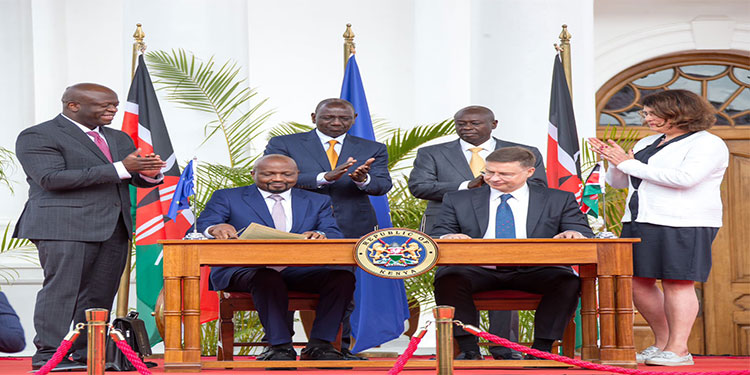
An ambitious Economic Partnership Agreement (EPA), intended to improve trade in goods and open up new economic prospects, has been reached, according to an announcement from the European Union (EU) and Kenya. It contains clauses that preserve the environment, climate change, and workers’ rights.
By completely opening up the EU market for Kenyan goods, the new EPA is anticipated to provide opportunities for Kenyan enterprises and exporters. The deal promotes EU investment in Kenya and increases stability and legal clarity, according to a press release from the European Commission.
Kenya, a pioneer in African sustainability programmes, is considered as a key ally in the fight against climate change. Along with the EU, Ecuador, and New Zealand, it also serves as co-founder of the Coalition of Trade Ministers on Climate initiative, which was established earlier this year. The EPA between the EU and Kenya solidifies this history by incorporating the EU’s new strategy for trade and sustainable development. It is noted that it includes strong pledges to commerce and sustainability, including legally binding rules on worker rights, gender equality, environmental protection, and preventing climate change.
The deal gives Kenya more time to gradually expand its market as well as protection for its emerging businesses and safeguards for agriculture. To increase Kenya’s economic competitiveness, the agreement include a section specifically devoted to economic and development cooperation. This cooperation, when combined with EU development aid, aims to help Kenya implement the EPA effectively and aid local farmers in meeting EU standards, utilising the benefits offered by the agreement, the announcement stated.
Negotiations came to an end at a ceremony in Nairobi that was presided over by Kenya’s cabinet secretary for the ministry of investments, commerce, and industry, Moses Kuria, and Valdis Dombrovskis, executive vice president and commissioner for trade of the European Commission, in attendance of Dr. William Samoei Ruto, the president of Kenya.
“It is a historic occasion to conclude negotiations for an agreement with Kenya—the region’s economic centre. It puts us squarely on the road to a privileged relationship based on faith, guidelines, and opportunity. As a result, new opportunities for collaboration and mutual benefit for our employees, companies, and merchants will emerge, bringing our regions closer together. This agreement formalises a shared dedication to sustainable development, which includes labour rights, environmental protection, and climate change mitigation. We now anticipate swift approval so that we can actualize this deepened partnership.” added Dombrovskis.
The EPA will next undergo a legal review (legal scrubbing), be translated, and then presented to the Council for signature and approval by the Commission. The agreement can be signed by the EU and Kenya after being approved by the Council. The draught will then be submitted to the European Parliament for approval after that. Sections of the EPA may be temporarily put into effect by the parties, but it won’t be fully effective until it has been approved by Kenya and all EU member states.
With commerce reaching €3.3 billion in 2022—a 27% rise from 2018—the EU is currently Kenya’s top export market and its second-largest trading partner.
